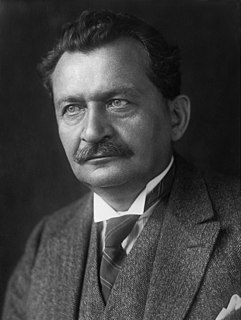The Autonomist Liberal Party, founded in 1878 and renamed to the simplified Liberal Party in 1898, was one of the major political parties in Cuba from 1910 until the Cuban Revolution in the late 1950s, when it was exiled.

General elections were held in Denmark on 12 December 1990. Although the election resulted in a strong gain for the Social Democratic Party, Poul Schlüter's coalition government was able to continue despite the Danish Social Liberal Party leaving. Schlüter's coalition consisted of the Conservative People's Party and Venstre. Voter turnout was 82.8% in Denmark proper, 54.4% in the Faroe Islands and 50.8% in Greenland.

Federal elections were held in Germany on 20 May 1928. The Social Democratic Party of Germany (SPD) remained the largest party in the Reichstag after winning 153 of the 491 seats. Voter turnout was 75.6%.
The Democratic Party is a center-right party in Bulgaria led by Alexander Pramatarski. The party is a member of the European People's Party (EPP).

General elections were held in Venezuela on 4 December 1988. The presidential elections were won by Carlos Andrés Pérez of Democratic Action, who received 52.9% of the vote, whilst his party won the most seats in the Chamber of Deputies and Senate. Voter turnout was 81.9% in the presidential election and 81.7% in the Congressional elections.

Folketing elections were held in Denmark on 16 November 1932, except in the Faroe Islands where they were held on 12 December. The Social Democratic Party remained the largest in the Folketing, with 62 of the 149 seats. Voter turnout was 81.5% in Denmark proper and 59.2% in the Faroes.
Federal elections were held in Switzerland on 28 October 1928. Although the Social Democratic Party received the most votes, the Free Democratic Party remained the largest party in the National Council, winning 58 of the 198 seats.
Federal elections were held in Switzerland on 25 October 1931. Although the Social Democratic Party received the most votes, the Free Democratic Party remained the largest party in the National Council, winning 52 of the 187 seats.
Federal elections were held in Switzerland on 23 October 1983. The Free Democratic Party emerged as the largest party in the National Council, winning 54 of the 200 seats. It was the first time the Social Democratic Party had not received the most votes in a federal election since 1925.
Federal elections were held in Switzerland on 21 October 1979. The Social Democratic Party and the Free Democratic Party emerged as the largest parties in the National Council, both winning 51 of the 200 seats.
Federal elections were held in Switzerland on 31 October 1971. Although the Social Democratic Party received the most votes, the Free Democratic Party emerged as the largest party in the National Council, winning 49 of the 200 seats. They were the first federal elections in which women were allowed to vote, following a referendum earlier in the year that introduced universal suffrage for federal elections.
Federal elections were held in Switzerland on 25 October 1959. The Social Democratic Party and the Free Democratic Party emerged as the largest parties in the National Council, each winning 51 of the 196 seats.
Federal elections were held in Switzerland on 30 October 1955. The Social Democratic Party emerged as the largest party in the National Council, winning 53 of the 196 seats.
Federal elections were held in Switzerland on 28 October 1951. Although the Social Democratic Party received the most votes, the Free Democratic Party remained the largest party in the National Council, winning 51 of the 196 seats.
Federal elections were held in Switzerland on 26 October 1947. Although the Social Democratic Party received the most votes, the Free Democratic Party emerged as the largest party in the National Council, winning 52 of the 194 seats.
Parliamentary elections were held in Bulgaria on 19 April 1997. The result was a victory for the United Democratic Forces, which won 137 of the 240 seats. Voter turnout was 62.9%. Following the election, SDS leader Ivan Kostov became Prime Minister.
Events in the year 1991 in Russia.

General elections were held in Brazil on 3 October 1994. The presidential elections were won by Fernando Henrique Cardoso of the Brazilian Social Democracy Party, who received 54.3% of the vote. Cardoso won the election by a margin of 27.3%, the largest in Brazilian history to date, and the first of his two landslide victories. The Brazilian Democratic Movement Party remained the largest party in the Chamber of Deputies and the Senate.

The National Liberal Party was a political party in Bulgaria.

The United Labour Social Democratic Party was a political party in Bulgaria.








